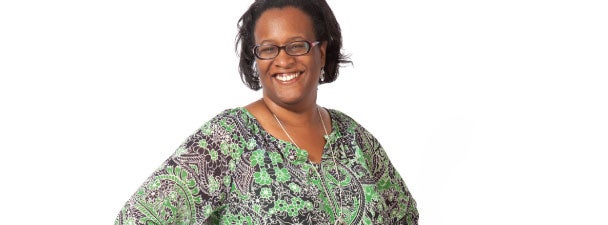As her students know, Conseula Francis, associate professor of English and director of the African American Studies Program, approaches literature in a slightly different way. Her willingness to look for literary merit in some unusual places has made her a classroom favorite. Recipient of the 2011 Distinguished Teaching Award, Francis took a few moments to talk about her passion for comic books and science fiction, her favorite foods and when/where she finds time for her own reading.
You have taught several classes on the graphic novel. Why? I think the graphic novel has been rising in literary importance since the publication of Maus, though Maus is certainly not the first comic book with literary merit. More and more people are realizing that comic books are more than superheroes, and more and more writers are turning to the form to tell their stories.
How did you get interested in black identity and representation in comic books? Comic books moved into my house when I got married. When there are that many issues of Amazing Spider-Man around, you can’t help but read them. I noticed how few characters of color there were (and are) in mainstream superhero comics, and started to ask why. At the time, I couldn’t have imagined I’d be writing about comic books. But turning hobbies into academic projects is an occupational hazard for college professors.
Of all the comic books you’ve been reading, which one is your favorite? I think my favorite series would have to be Fables by Bill Willingham, about characters from storybooks (Snow White, the Three Little Pigs, Sinbad, etc.) escaping from their world into ours as they battle The Adversary. It’s well-written, well-plotted and addictive. I also really like Scalped, about an undercover Native American FBI agent investigating corruption on a reservation.
Your first book focused on Octavia Butler. What about her writing inspired you? I tend to geek out about all things science fiction. One of the first things my husband and I bonded over is our irrational love of Star Wars. So when I found Butler’s work, great science fiction with black female protagonists, I was sold.
You have a forthcoming book about writer James Baldwin. Why is Baldwin relevant to a 21st-century “post-racial” audience? I think Baldwin would have had a great laugh at the notion of “post-racial.” He always insisted on his American-ness and his blackness. These two things are mutually defining. The same is true for white Americans and other Americans of color. The nature of this country is that we cannot separate our national identity from our racial identity. Our goal then is not to work past race, but, instead, to move through it, facing what is ugly and what is beautiful. As Baldwin reminds us in his essay “A Stranger in the Village,” for all there is to be said about the difficulty of race relations in this country, we must also always be reminded that America has been a racially, ethnically and culturally diverse society for 300 years.

If you had to pick just one, what is the most important African American novel to date? How can I pick just one? I’ll choose the two I re-read most often, and they aren’t novels: Souls of Black Folk by W.E.B. Du Bois and Notes of a Native Son by James Baldwin, both collections of essays. There are still no better meditations on race in America than these two works.
When do you read? I read during my daughters’ soccer practices and yoga classes. I read on airplanes and in airports. I read in the evenings after my kids have gone to bed. Most of my reading for pleasure happens during school breaks.
Do you ever have stage fright? All the time. At the beginning of each semester, I have to give myself a pep talk before I teach my first class. I also spend a ridiculous amount of time picking out my Day One outfit.
What’s one food you could not live without? Candy. And I’m not talking fancy candy – Skittles, Reese’s Peanut Butter Cups, Sour Patch Kids. It’s a really bad habit.
What literary landmark do you want to see? I’m dying to visit W.E.B. Du Bois’ house in Ghana. Some of his papers and books are still there. We hope to take students there in March.
What’s your guilty pleasure on TV? People are going to think all I do is watch TV and read comic books. I’m currently crazy about Smash, the show about a group of people trying to put on a Broadway show about Marilyn Monroe. I’m a sucker for musicals. I also really love Being Human on SyFy. Apparently I’m also a sucker for angsty supernatural monsters.
Why is it important for the College to have a major in African American studies? The history of the Lowcountry and of the College demands that we have an African American studies major here. Charleston is too important in the history and culture of the African diaspora for us to ignore. We should be educating our students about that history and training them to document, preserve and tell that history themselves. A major in African American studies will also help prepare students to live and work in diverse communities, whether it is the community right around us here at the College, or other communities anywhere in the world.
If you could be the main character in any story, which one would it be? Does Star Wars count as a story? I totally want to be Han Solo. Because Han is a scoundrel and a smuggler who comes to realize the importance of doing the right thing, even when there’s nothing in it for you. I love that character arc. Plus, he gets to pilot the Millennium Falcon (who doesn’t want to fly that ship?). And he shot first, no matter what George Lucas says.




